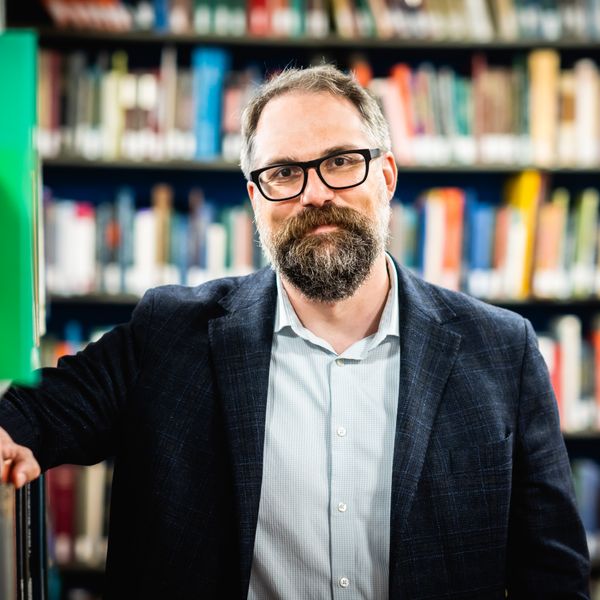Photo: This dazzling infrared image from NASA Spitzer Space Telescope shows hundreds of thousands of stars crowded into the swirling core of our spiral Milky Way galaxy. Photo courtesy of NASA/JPL-Caltech

Orbital is a meditation on the nature of relationships, time, loss, and the beauty and the brevity of human life, reminding us of the commonalities and differences that comprise humankind.
As I read this book, I was struck by the sense of community shared by this crew of astronauts and cosmonauts—people from very different cultures and walks of life—joined by their shared commitment to their missions and ambitions.
Last year, Boston University launched a project called Living Our Values to surface the values that unite us as a community. As one of the largest universities of its kind with more than 450,000 living alumni, our shared values unite us across time and space, far beyond our campus walls. And Orbital reminds us that we can do great things when we come together—in spirit or in proximity. Our colleagues inspire us, challenge us, make us question ourselves, and encourage us.
These six astronauts and cosmonauts are confined to small spaces in the International Space Station, circling the Earth in low orbit, dreaming about their colleagues who are bound for the moon. I was fortunate once to be seated at a dinner next to the astronaut Michael Collins, who commanded Apollo 11 while Neil Armstrong and Buzz Aldrin walked on the moon. He was too modest to talk much about himself and that singular voyage. As I looked into his eyes, he inspired me to imagine what it must have been like to travel to the moon.
Orbital also reminds me that there are remarkable people, like Michael Collins, who inspire us to reach higher than we might have imagined possible.

As you begin your journey at BU, Orbital offers a shared starting point—a reminder that perspective changes everything. Set far above the Earth, it invites us to see our world, and one another, with fresh eyes. In a time when it is easy to feel divided, the book asks us to notice the fragile beauty of our shared home and the connections that bind us together. It’s a meditation on curiosity, responsibility, and what it means to be a part of something larger than ourselves. This is the spirit I hope you carry into your first year: the willingness to step back and see the bigger picture, to recognize that the people you meet and the challenges you face are part of a much wider orbit of learning and growth.

Right from the novel’s outset, Samantha Harvey weaves an extraordinarily focused meditation on the power of perspective to illuminate a discussion on the meanings of life and the impacts of human achievement—and I just became filled with the excitement at the prospect of connecting Orbital’s stories with the experiences and aspirations that follow each of us into university life. Touching on technology and the arts and politics and philosophy, the novel offers countless entry points and ample room for dialogue around its insights. Harvey moves between reflections on grief, reckoning, belief, maturity, and sustainability seamlessly—but without favoritism and judgment. In doing so, she leaves space that validates the experiences of those embarking on journeys of learning and coming to their own reasoned conclusions and awareness. That journey of learning and discovery is at the heart of university life.
Among the novel’s many powerful passages, one that neatly illustrates what I love so much about the text takes place in “Orbit 5, ascending”: Anton, a Russian cosmonaut, is reflecting on Michael Collins’s famous picture of the Earth from the Apollo 11 moon landing and the familiar observation that it is the only image ever taken that includes every living person except one, the photographer. But Anton sees this interpretation as fully backward: “The strongest, most deducible proof of life in the photograph is the photographer himself…. In that sense...he is really the only human presence it contains.” Moments like these permeate the novel and invite the reader to celebrate the opportunities to make meaning of our relationships to each other and to the world when we seek new vantage points. For the incoming class of 2029, your university experience will overflow with such opportunities. Orbital invites us all to complement our collective drive with reflection and our ambitions with consideration of what it is all for. I’m thrilled for our community to embark on a new set of shared experiences this coming year and for Orbital to serve as a lingua franca to all of the above.

In Orbital, Harvey’s narrative offers insight into our human condition, particularly in states of transition, exploration, and adjustment. While reading the book, I found myself thinking about how it often provided a compelling metaphor for those experiencing significant life changes, like college students. For example, the solitude, reflection, and growth experienced by the astronauts in Orbital has similarities for the journey that many college students undertake during their first year at college. Adapting to periods of isolation can be challenging for students who are used to a constant bustle of friends, family, school, activities, and work. However, the initial longing for those familiar connections often transforms into a sense of belonging within one’s campus community, particularly as students (like the astronauts) learn to bridge differences and form new connections. Like the fighter pilot who found himself in an art class, the willingness to explore new domains may not only enrich intellectual and personal growth, but, as Harvey illustrates, also lead to life-changing connections. This is the very spirit we hope our students embody during their time here: an openness to new disciplines, friendships, learning, and perspectives.
